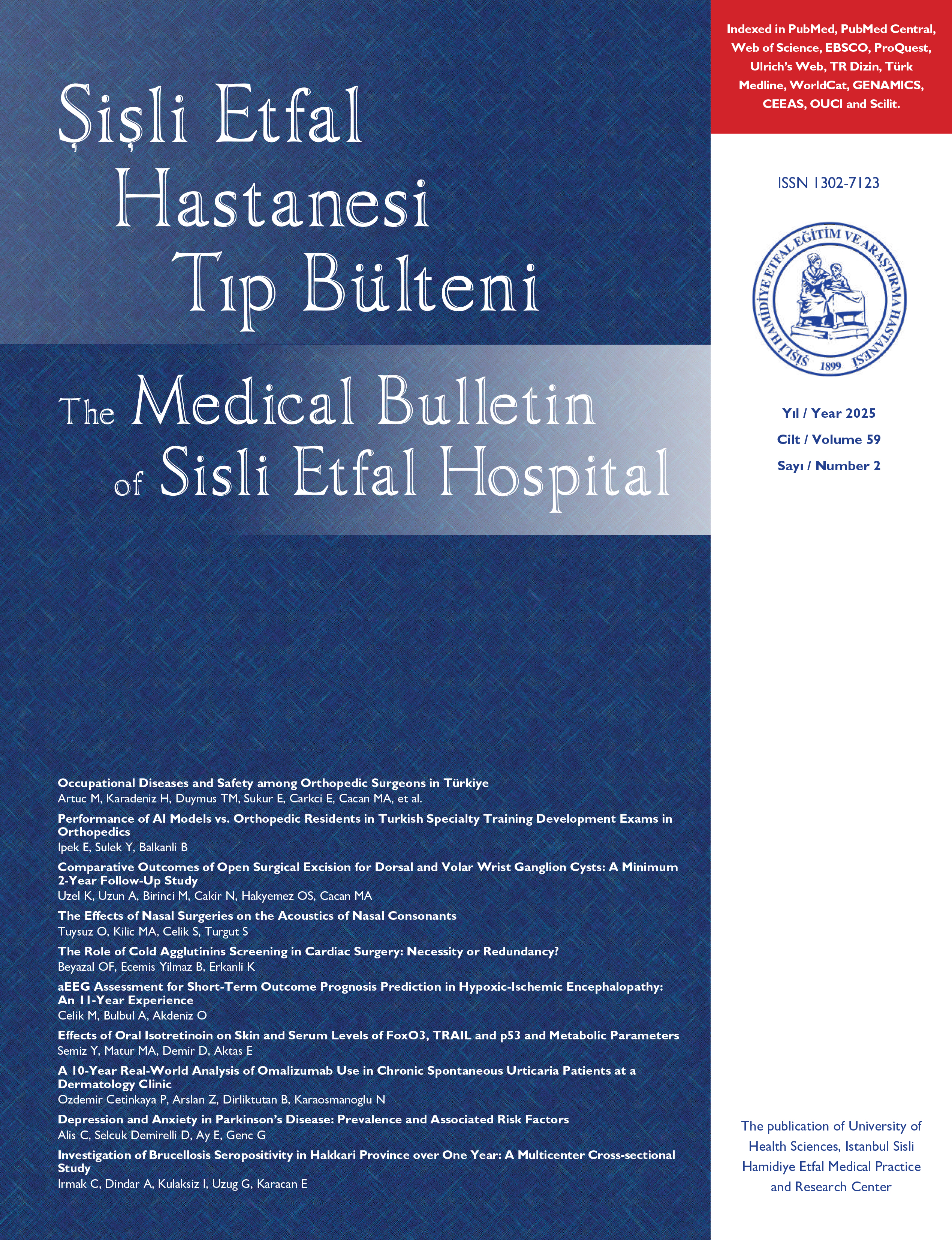
Akut iskemik inmeli hastalarda non-HDL, total kolesterol, HDL kolesterol ve LDL-kolesterol düzeyleri
Nihal Boğdaycıoğlu, Müjgan Ercan, Sema Uysal, Semra Mungan Öztürk, Fatma Meriç YılmazAnkara Numune Eğitim ve Araştırma Hastanesi, Tıbbi Biyokimya Kliniği, AnkaraGiriş ve Amaç: İskemik inme, vasküler hasara bağlı olarak beynin belirli bir bölgesine serebral kan akımının azalması ile birlikte akut gelişen nörolojik bozukluk olarak tanımlanmaktadır. İskemik inme önemli bir morbidite ve mortalite nedeni olup ölüm nedenleri arasında 3.sırada yer almaktadır. Tüm inmelerin yaklaşık %80i iskemik nedenlere bağlıdır. İskemik inmelerin en sık nedeni ise aterosklerotik plak rüptürü veya plak üzerine trombüs eklenmesidir. Ateroskleroz, ilk oluşum evrelerinden itibaren kan lipid düzeyi ile ilişkili bir süreçtir. Biz çalışmamızda akut iskemik inmeli hastalarda non-HDL, Total Kolesterol, HDL Kolesterol ve LDLKolesterol düzeylerini incelemeyi hedefledik.
Gereç ve Yöntemler: Çalışmaya Aralık 2009 - Mayıs 2010 tarihleri arasında Ankara Numune Eğitim ve Araştırma Hastanesi Nöroloji Servisine ilk 24 saatlik akut dönemde başvuran ve akut iskemik inme tanısı alan 52 olgu ile 42 sağlıklı birey katıldı. Hasta ve kontrol grubunun total kolesterol, trigliserit ve HDL kolesterol düzeyleri DXC-800 otoanalizöründe (Beckman-Coulter, ABD) ölçüldü. LDL kolesterol, Total kolesterol/HDL kolesterol ve non-HDL kolesterol düzeyleri ise formüllerle hesaplandı.
Bulgular: Hasta grubunda kontrol grubuna göre HDL-K seviyeleri anlamlı olarak düşük (p=0.009) iken, trigliserit ve total kolesterol/HDL seviyeleri ise anlamlı olarak yüksekti (p=0.013,p=0.018). Total kolesterol, LDL ve non-HDL kolesterol seviyelerinde gruplar arasında istatistiksel olarak anlamlı farklılık yoktu. Non-HDL kolesterol düzeyi ile trigliserit, total kolesterol ve LDL kolesterol arasında anlamlı korelasyon bulunurken (sırasıyla r=0.468, r=0.964, r=0.851) (sırasıyla p<0.001, p<0.001, p<0.001), HDL kolesterol ile anlamlı korelasyon yoktu.
Sonuç: Akut iskemik inmede önemli risk faktörü olan aterosklerozun patogenezinde rol oynayan dislipidemik süreçte, total kolesterol, non-HDL kolesterol ve LDL kolesterol düzeyleri açısından anlamlı bir farklılık bulunmadığı fakat trigliserit ve total kolesterol/HDL kolesterol ve HDL kolesterol düzeyinin anlamlı bir farklılık bulunduğu sonucuna varılmıştır.
Non-HDL cholesterol, total cholesterol/HDL cholesterol and LDL-cholesterol levels in patients with acute ischemic stroke
Nihal Boğdaycıoğlu, Müjgan Ercan, Sema Uysal, Semra Mungan Öztürk, Fatma Meriç YılmazDepartment of Medical Biochemistry, Ankara Numune Training and Research Hospital, Ankara, TurkeyObjective: Ischemic stroke is defined as acute neurological disorder according to cerebral vascular damage and reduced blood flow to a particular region of the brain. Ischemic stroke is a major cause of morbidity and mortality and placed 3rd among the causes of death. About 80% of all strokes depend on ischemic cause. Atherosclerotic plaque rupture or addition of a thrombus on plaque is the most common cause of ischemic stroke. Atherosclerosis is associated with the level of blood lipids from the first stages of the formation process. In our study, we aimed to investigate non-HDL, total cholesterol / HDL-cholesterol and LDL-cholesterol levels in patients with acute ischemic stroke.
Methods: This study was performed in 52 patients who were admitted at Ankara Numune Hospital for Education and Investigation, Division of Neurology between December 2009- May 2010 with a diagnosis of acute ischemic stroke in the first 24 hours and 48 healthy individuals matched for age and gender, who was admitted at the hospital during the same period. Total cholesterol, triglycerides and HDL cholesterol levels were measured by DXC 800 autoanalyzer (Beckmann-Coulter, USA). LDL cholesterol, total cholesterol / HDL-cholesterol and non-HDL cholesterol levels were calculated according to the formulas.
Results: Patient group had significantly lower HDL-C levels than the control group (p=0.009), whereas the triglyceride and total cholesterol / HDL-C levels were significantly higher (p=0.013, p=0.018). Total cholesterol, LDL cholesterol and non-HDL cholesterol levels did not differ significantly between groups. There were significant correlations between non-HDL-cholesterol levels and triglycerides, total cholesterol, LDL cholesterol (respectively r=0.468, r=0.964, r=0.851) (respectively p<0.001, p<0.001, p<0.001), and there was not a statistically significant correlation between non HDL -cholesterol and HDL cholesterol.
Conclusion: Dyslipidemia process plays a role in the pathogenesis of atherosclerosis which is an important risk factor for acute ischemic stroke. In our study, in terms of total cholesterol, non-HDL cholesterol and LDL cholesterol levels, there was not a significant difference but triglyceride, total cholesterol / HDL-cholesterol and HDL cholesterol levels were found to be significantly different.
Makale Dili: Türkçe



















